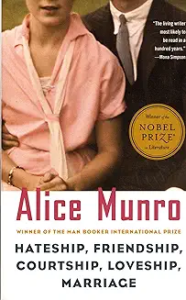Hateship, Friendship, Courtship, Loveship, Marriage by Alice Munro 2001
Alice Munro died on May 13, 2024 at the age of 92. She won the International Booker Prize in 2009 and the Nobel Prize in 2013 for her body of work comprising only short stories. She never wrote a novel. The Nobel citation referred to her as the “master of the contemporary short story” who could “accommodate the entire epic complexity of the novel in just a few short pages.” Other than a brief sojourn in Vancouver where she established a bookstore that still exists, she lived in small towns in Ontario where nearly all of her stories were sited.
I had read several of her short story collections and chose “Hateship, Friendship, Courtship, Loveship, Marriage” because there it was on the shelf at the Cambridge Public Library and also because I was taken with the title. The latter turns out to be a game similar to ‘he loves me, he loves me not’ played by adolescent girls about their boyfriends.
I loved this book. The nine stories were each tiny gems or elegant quilts fashioned with skill and care by Munro. They deal with the complex relationships between men and women, with family and the complex relationships between parents, children, and siblings. They deal with the incredible richness of life and its unpredictable ups and downs. The stories are wonderfully written most containing a sudden and unanticipated shift in time, place, or life events.
In writing this review and looking back over the nine stories, I was reminded of how much I enjoyed each and every one of them, from the story of Johanna who moves to Alberta for a marriage that was created out of fantasy by two girls to the final story, the much-anthologized “The Bear Came Over the Mountain”, a nearly unbearable tale of love, dementia, and loss. In one of those ironies of life imitating literature, Munro herself suffered from dementia during the last 12 years of her life. Sadly, shortly after Munro died, her daughter revealed that her father had sexually abused her from the age of 9 through her adolescence. She had evidently told her mother who briefly separated from her husband but eventually reconciled. An examination of this saga appeared recently in the July 18, 2024 issue of The New Yorker in which several women authors discuss how this revelation impacted their view of Munro and her work.
In the ongoing debate as to whether an author’s life with all its mistakes, errors, and disasters should affect the views of the value of her writing, I come down on the side of separating the two. Despite Muro’s evident failure as a parent, she has written these wonderful stories. I urge you to read her work, if not this volume than one of the other 14 collections or the 8 compilations of her stories.



